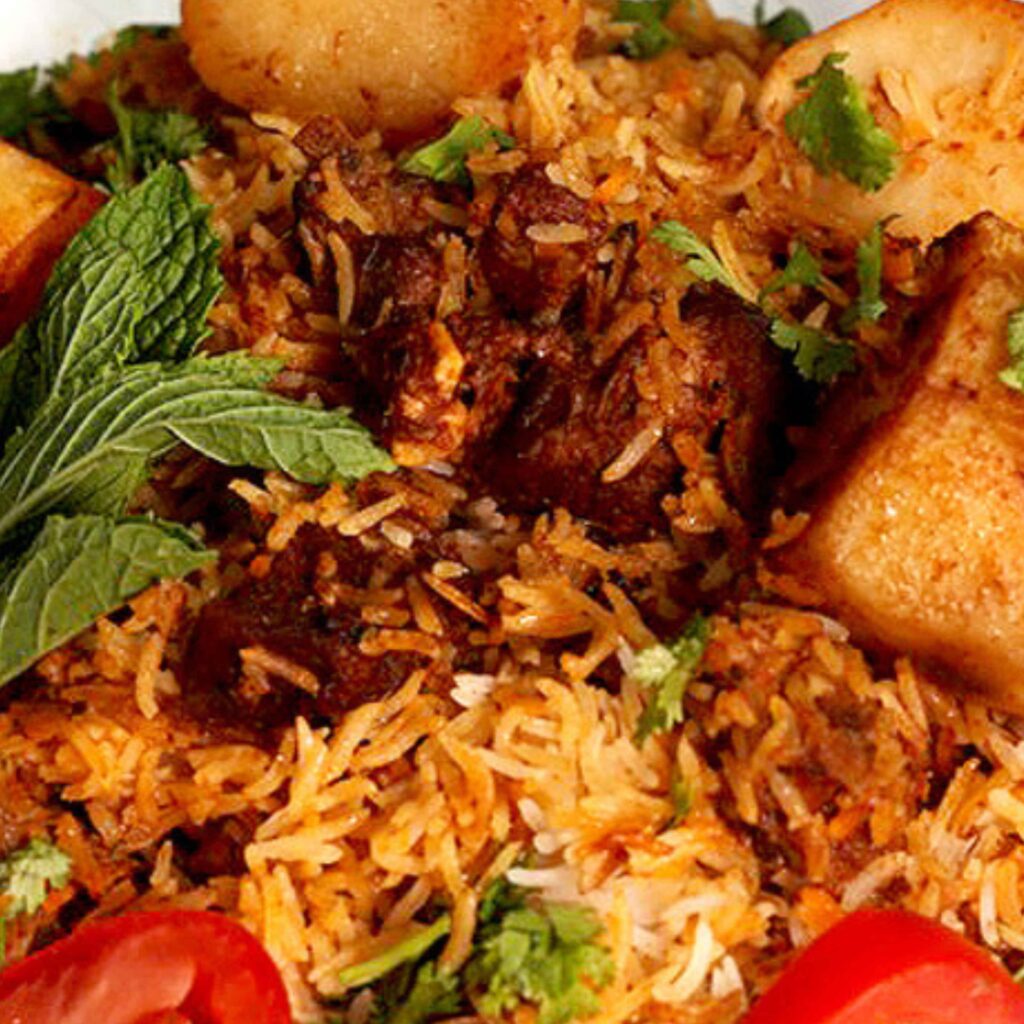
Sindhi Biryani



Introduction and History of Sindhi Biryani: A Flavorful Journey through Sindhi Culture
In the realm of aromatic rice dishes, Sindhi Biryani shines as a culinary jewel that carries within it the essence of Sindhi culture and heritage. Originating from the Sindh region of Pakistan, this biryani boasts a rich history that marries flavors, traditions, and a legacy of culinary excellence.
Origins Rooted in Sindh
Sindhi Biryani’s history can be traced back to the fertile lands of Sindh, where it emerged as a celebration of flavors and the region’s diverse influences. The biryani is a testament to Sindh’s role as a crossroads of cultures, where culinary traditions converged and evolved over time.
The Fusion of Tastes
At its core, Sindhi Biryani exemplifies the fusion of tastes that define the region’s cuisine. Basmati rice, aromatic spices, tender meat, and a medley of ingredients come together to create a harmonious symphony of flavors that tantalizes the palate.
The Aroma of Tradition
Sindhi Biryani’s allure goes beyond taste; it’s an aromatic masterpiece that fills the air with the fragrance of saffron, cardamom, and other spices. The dish is a testament to the meticulous craftsmanship that goes into creating a biryani that’s rich in aroma and taste.
A Celebration of Occasions
Sindhi Biryani holds cultural significance as a dish often prepared during special occasions, family gatherings, and celebrations. It symbolizes the unity of loved ones who come together to savor the flavors that have been treasured for generations.
A Culinary Legacy
The history of Sindhi Biryani is a narrative of a culinary legacy passed down through families and communities. As generations shared their recipes and techniques, the biryani evolved while retaining the core essence that defines it.
Conclusion
Sindhi Biryani isn’t just a dish; it’s a journey through time, flavor, and the cultural heritage of Sindh. With its origins in the heart of the region and its presence on tables that symbolize togetherness, this biryani embodies the essence of a flavorful past and a vibrant present. As you savor the aromatic rice, tender meat, and intricate spices, you’re not just indulging in a meal; you’re experiencing the history, heritage, and taste that Sindhi Biryani carries with every mouthful.
- Serves: 6 People
- Prep Time: 30min
- Cooking: 1hr
- Difficulties: medium
Ingredients
For Cooking
- 2 cups basmati rice, soaked
- 500gcut into pieces bone-in chicken or mutton
- 2large onions thinly sliced
- 4tomatoes, chopped
- 1/2 cup plain yogurt
- 1/4 cup cooking oil
- 2tablespoons ghee (clarified butter)
- 2 teaspoons ginger-garlic paste
- 1 teaspoon cumin seeds
- 1teaspoon red chili powder
- 1/2 teaspoon turmeric powder
- 1/2 teaspoon garam masala
- 1/2 teaspoon black cumin seeds (shah jeera)
- 1/4 teaspoon saffron strands, soaked in milk
- Fresh coriander leaves, chopped
- Fresh mint leaves chopped
- Salt, to taste
For Dressing
Nutritional Information
-
Calories:
400 -
Total Fat
15g -
Saturated Fat
5g -
Cholesterol
50mg -
Sodium
600mg -
Total Carbohydrates
60g -
Dietary Fiber
3g -
Sugars
4g -
Protein
12g
Procedure
Conclusion: Sindhi Biryani is a symphony of aromatic spices and tender meat, capturing the essence of the Sindhi culinary heritage. Whether you choose the classic chicken or mutton version or opt for a vegetable twist, this dish promises a burst of flavors in every mouthful. With its intricate layers and fragrant aroma, Sindhi Biryani is a celebration of tradition and taste. Serve it at gatherings or enjoy it with loved ones at home – this dish is sure to delight and satisfy.
-
Mark As Complete
Heat oil in a large pot. Add cumin seeds and black cumin seeds. Once they splutter, add sliced onions and sauté until golden brown.
-
Mark As Complete
Add ginger-garlic paste and sauté until aromatic.
-
Mark As Complete
Add chicken or mutton pieces and cook until they change color.
-
Mark As Complete
Stir in chopped tomatoes, red chili powder, turmeric powder, and salt. Cook until tomatoes are soft and oil starts to separate.
-
Mark As Complete
Add plain yogurt and cook for a few minutes until the oil separates again.
-
Mark As Complete
In a separate pot, parboil the soaked rice with a pinch of salt until it’s 70% cooked. Drain the water and set aside.
-
Mark As Complete
Layer the cooked meat mixture with rice in the large pot. Sprinkle garam masala, chopped coriander, and mint leaves between the layers.
-
Mark As Complete
Drizzle saffron milk over the top layer. Cover the pot with a tight-fitting lid and place it over low heat for 15-20 minutes to allow flavors to meld.
-
Mark As Complete
Once done, gently fluff the rice with a fork. Serve hot with raita or yogurt salad.
Dawood Ali Mian
Chef Dawood brings a wealth of experience and a diverse culinary background to our kitchen. His culinary training spans the globe, from classic French techniques to contemporary fusion cuisine. Drawing inspiration from both traditional and modern culinary traditions, Chef Dawood’s creations are a harmonious blend of flavors and textures that tantalize the palate.
You also might like
No recipe were found.



